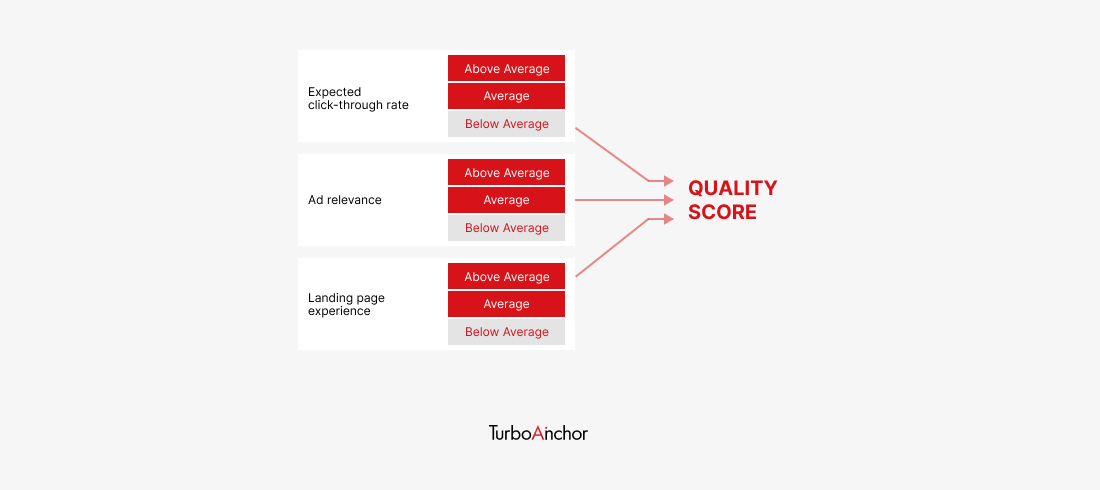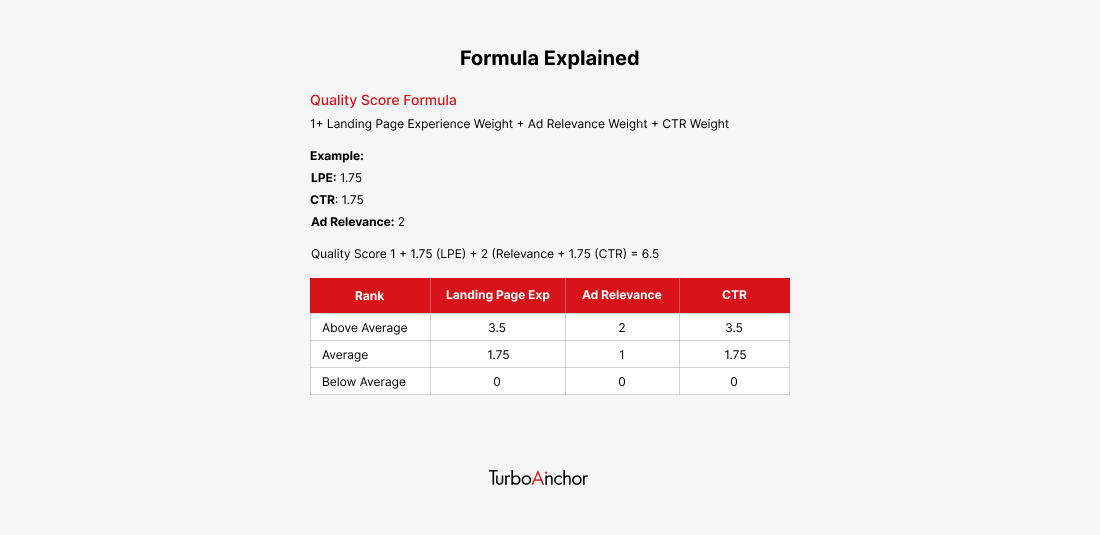Google ads quality score is a keyword-level score on a 1–10 scale. Every keyword in your google ads account is assigned a quality score. Whereas a quality score of 8–10 is considered very good.
Firstly, for someone who wants to master PPC, especially google ads, you need to understand the quality score. Your quality scores greatly influence the cost and effectiveness of your paid search campaigns. Your credit score can affect whether you are eligible or not for a loan and how high your interest rate is. Just like, google quality score influences how your PPC ads perform and how much you pay for each click. For a clear understanding, a quality score judges how relevant your ads, keywords, and landing pages are to the audience seeing the ads, setting a value between 1 and 10.

Higher-quality scores lead to lower cost per click and better ad positions, and lower scores suggest there’s space to improve and higher cost per click. To decide the ranking of your ads in the search engine result pages, Google checks the bids and the quality scores of all competing ads and ranks them.
Max CPC X Quality Score = AdRank
Difference between Quality Score and Ad Rank?
People often get confused between Quality score and Ad rank. Both seem like Google’s way of evaluating your campaigns, and even so, they’re related, they’re not the same.
Quality Score is Google’s way of giving advertisers a tool to improve their campaigns. Thus, when keywords ads and landing pages are evaluated, the Quality score informs advertisers on how to adjust their campaigns accordingly. On the other hand, Ad Rank is google’s way of taking campaign information into account to determine where your ad will appear on search engine results pages.
How To Calculate Quality Score?
When it comes to calculating Google Quality Score, it considers three key factors related to keywords, ads, and landing pages.
Following are the three key factors,
- Expected CTR
- Ad Relevance
- Landing Page Experience

Expected CTR
Expected CTR is google’s estimation that measures how likely someone will click your ad when searching for its keyword. In calculating expected CTR, google considers how well your keyword has performed in the past, based on the position of your ad. Expected CTR can help determine a quality score based on the idea that the user’s search phrase will match your keyword exactly. While in real-time, google goes for an accurate expected CTR based on search terms and the type of device and different auction factors.
Ad Relevance
Ad relevance, also known as keyword relevance, refers to how closely your keywords relate to your ads. Ad relevance is one of the three components of a quality score. It is used to understand the overall quality of your ads.
For example, keywords like “content marketing agency” or “digital marketing agency” might be relevant to your marketing agency. Using the same ad for both keywords, you will sacrifice its relevance. That’s how you measure ad relevance.
For someone facing ad relevance is below average. Check your keyword groups aren’t too large. If your ad is more relevant to your keyword groups, you are more likely to have a high ad relevance.
Landing Page Experience
For starters, Google measures your landing page experience. For instance, “how relevant and useful your website’s landing page will be to people who click your ad.”
There’s a reason why Google claims their big three landing pages cause of their quality factors:
- Relevant and original content
- Transparency / Clear
- Navigability
Google wants to force advertisers to make quality websites that users will find useful and relevant, making them the top dog search engine. Landing page quality shouldn’t only be important for google. It should be important for advertisers too. Sticking to the guidelines for a good landing page is also more likely to help advertisers turn visitors into customers and improve ROI.

How Do You Increase Your Google Ads Quality Score?
Subsequently, you are aware that the quality Score in Google Ads and Microsoft Ads decides where and how often your ads appear. Therefore, it’s good to increase your ratings by consistently working on your account. You can achieve such results by focusing on these steps:
Research Keywords
It’s considered a good idea to have a proper game plan or research before taking any action. Keywords are one of the most important factors that influence your quality score. Thus, when a user types words in a search box, the words they’ll use will determine whether or not your site or ad will show up. There are numerous keywords out there. It’s not about the words themselves, but the combinations used when being searched are equally important. When you pick a specific keyword, the research can suggest what keywords are being used, how important they are to users, and what opportunities to draw traffic to your website.
Targeting Ad Groups
First, start setting up your campaigns; use as many ad groups as you need to, as long as they are relevant to the keywords used. If they aren’t relevant, don’t use them. Suppose you only have a couple of ad groups using the same keywords. In that case, this will not make your ads relevant to your users because it will be tough to find the specific ad they are looking for.
Each group of ads should have its own set of relevant keywords. That’s the only way you will be able to target groups effectively. Make sure the keywords used are logical and match what the ad groups are looking for. You can use tools to figure out what keywords are most relevant to your ad groups. By targeting your ad groups with specific keywords, you can work towards enhancing your quality score.
Refining Ad Text
It’s not much of a rocket science thing to consider. Words that are nicely written are more likely to attract customers. Without high-quality ads, you may not get the desired results. So the question arises: What are high-quality ads? A high-quality ad will focus on a single product or service to draw in the type of crowd you want. Ads that offer more than one product are often not so effective. Customers want to feel as though they are really and truly getting what they want and need from your ad. When the ad has too many details, it will drive your customers away. Ads that are clear and precise will have more of an impact. By refining your AdWords ads, you will be able to boost your quality score.
Optimizing Landing Pages
People often sleep on how important a landing page is to visitors, but it is often the first page that people see if you think about it. So, if your landing page is not in good shape, is not easy to access, and is confusing to your visitors, that will end up with a lower quality score. Consider using an analytics site, google page speed insights and google mobile-friendly test to run statistics on your landing page. By figuring out your score on your landing page, your development team will be able to decide what needs to be done to improve and boost your quality score.
Adding Negative Keywords
You might be thinking about what negative keywords are. You include negative keywords in your ad groups that prevent your ad from showing up. It may sound like a strange little move to make. Here you are figuring that the keywords you are using are helping you to gain visitors when, in fact, they are turning people away from your site. When the negative words are used to search, your ad will not show up to the searchers.
So, the question comes to mind: why are we discussing this when we are supposed to figure out how to improve your score? Well, the answer to negative keywords can be beneficial in some way. You can use keywords to ensure that people who are not in your target ad group are not finding your ad. As a result, this will increase your click-through rate.
Conclusion
Lastly, a quality score will help you grow your business, gain more customers, and will save you money in the long run. This score can be a valuable part of your market research. Use it to ensure that your website or ad is doing its job. It will help you determine what is happening on your website or ad and what you need to do to improve it. The first step to improving is to figure out what is happening and what needs to be fixed. Give all of your users the best possible user experience by ensuring that your steps make their lives easier.